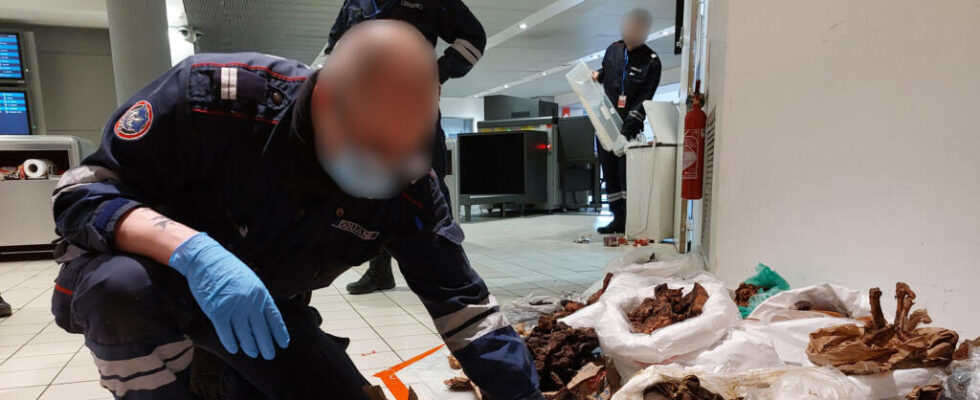At Roissy-CDG airport, north of Paris, kilos of plants, meat, but also protected animals are seized by French customs every week. Faced with the high health risk and attacks on endangered species, customs officers are trying, as best they can, to slow down a constantly growing market.
While rummaging through the suitcase, under the large pile of clothes, the customs officer spots a plastic bag filled with a green substance. “What is that ? “, she launches with authority. “ Are these crushed leaves? So it’s vegetable. Plants are prohibited if you do not have valid certificates. Do you have one? The traveler, who arrives from Mali, answers in the negative. “ So it’s gonna be divested “, decides the customs officer.
In total, 7 kilos of plants and 4 kilos of dried meat are intercepted by customs. Fortunately for this man, no fine or prosecution, but a simple divestiture slip to fill out and sign. He leaves free, but without a good part of his load.
“ We are sure to go into the wall! »
Checks like this, French customs carry out dozens of them every day at terminal 2 of Roissy-Charles-de-Gaulle airport, located north of Paris. Every week, between 600 kilos and one tonne of plants, bushmeat intended for consumption, dead or living animals are seized, and up to 35 tonnes per year.
This figure, already impressive, is undoubtedly underestimated . “ I think if we could control everything, we would make 5 to 10 tons more “, calculates Adrien Clopier, the deputy head of the brigade. Because even with 40 customs officers at terminal 2 and nearly 1,600 throughout the airport, it is impossible to capture everything. “ Colleagues won’t necessarily have the time to do all the checks in such detail, because there are so many flows every morning. The important thing for us is to seize the goods and sanction according to the volume or type of fraud. Whatever happens, it will be contained and maintained on the territory: we observe, we seize, we destroy “unfolds Adrien Clopier.
This illegal market of plants and protected species involves health risks for fauna, flora and for humans. Emmanuel Bizeray, head of customs at Roissy, despite being bound by the duty of reserve, does not go around the bush: “ The risk is not even calculated, we are overwhelmed! We are sure to go into the wall! We have a clear risk of finding ourselves, at one time or another, with patients with serious illnesses, haemorrhagic fevers, which they will have contracted on French territory because they have consumed meat or have been in contact with meat that comes from these countries. All the same, at some point, there will have to be answers! »
Give more resources to customs officers, but not only
The answers, precisely, Maud Lelièvre, president of the International Union for the Conservation of Nature (IUCN), pushes for them to be taken into account by decision-makers. We must, she says, give more resources to customs officers, men and sniffer dogs, but also better inform travelers about what they can bring back in their suitcases, and seize illegal goods from the airport of departure.
It also appeals to airlines: “We must reduce the number of transportable luggage per person. Today, people can have twice 23 kilos of luggage per person, it’s too much. One out of two suitcases contains foodstuffs and live animals. You have to manage to destroy the chain step by step.Among these companies, there is Air France, which allows two checked bags of 23 kilos each for passengers bound for Africa.
The Secretary of State for Ecology, Bérangère Couillard, announced on Wednesday February 15 the creation of a working group to find “concrete and rapid measures“. This consultation must be launched quickly. But as an aside, the head of customs at Roissy, Emmanuel Bizeray, laments: “We have learned nothing from the coronavirus crisis…»
